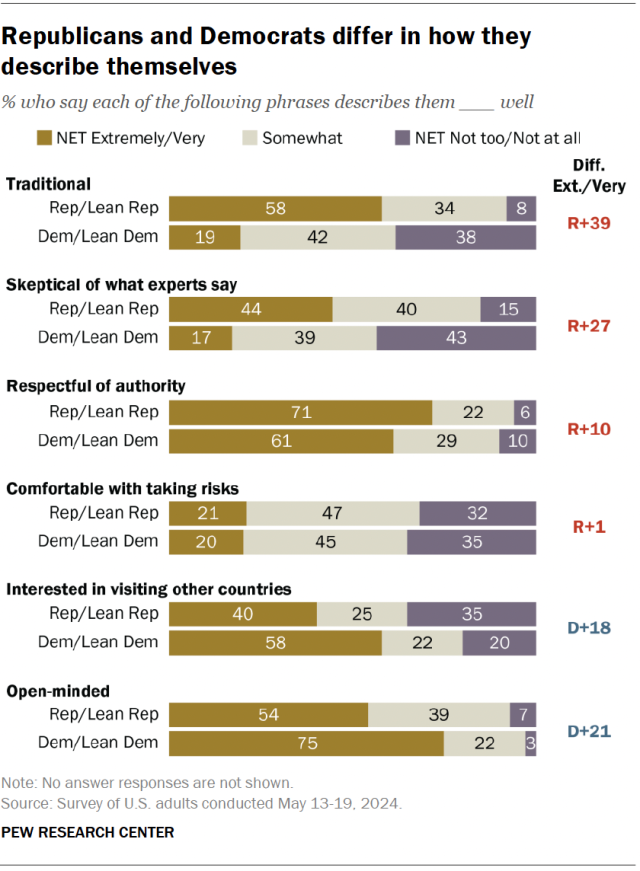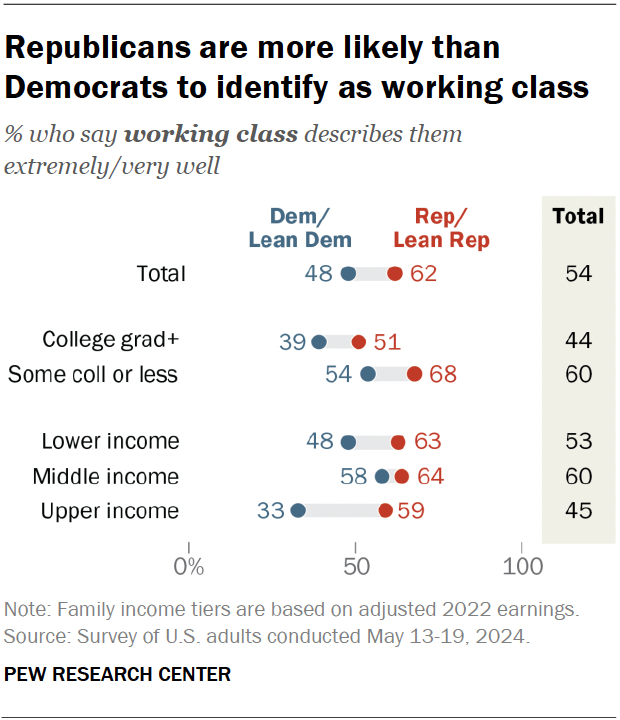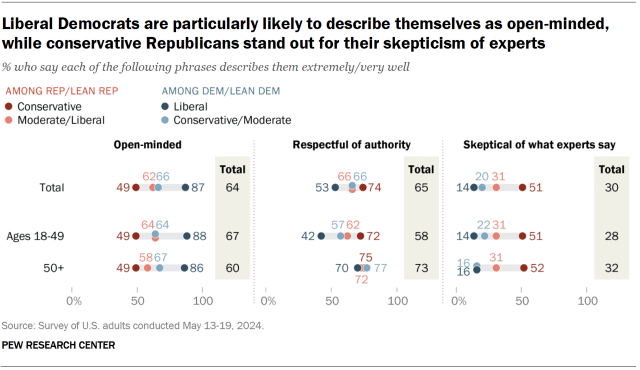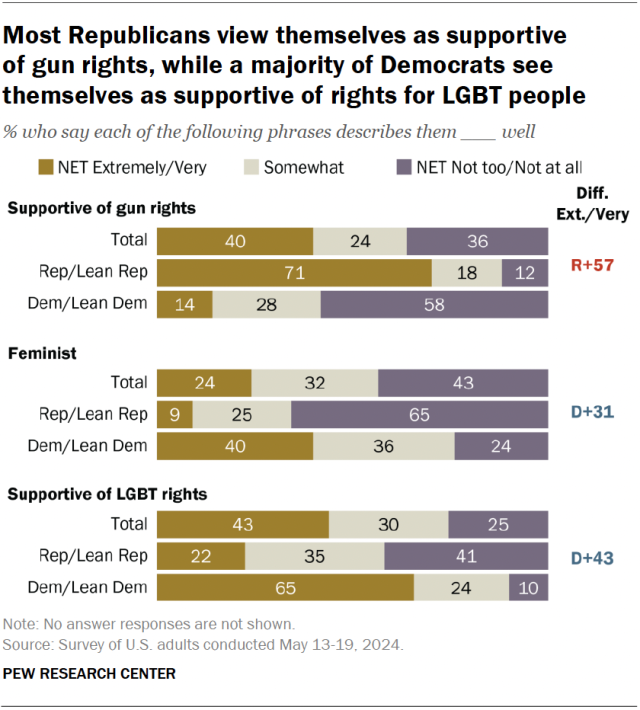Public attitudes are highly partisan on a wide array of topics. And partisanship appears in some of the ways that Americans describe themselves, too, according to a May Pew Research Center survey.
Pew Research Center conducted this analysis to better understand how Americans describe themselves. For this analysis, we surveyed 8,638 U.S. adults from May 13 to 19, 2024.
Everyone who took part in this survey is a member of the Center’s American Trends Panel (ATP), an online survey panel that is recruited through national, random sampling of residential addresses. This way nearly all U.S. adults have a chance of selection. The survey is weighted to be representative of the U.S. adult population by gender, race, ethnicity, partisan affiliation, education and other categories. Read more about the ATP’s methodology.
Here are the questions used for this analysis, along with responses, and its methodology.
Republicans more likely than Democrats to call themselves traditional, skeptical of experts

When asked how well various traits describe them, roughly six-in-ten Republicans and Republican-leaning independents (58%) say that “traditional” describes them extremely or very well. Just 19% of Democrats and Democratic leaners say the same.
Republicans are also more likely than their Democratic counterparts to embrace the description “skeptical of what experts say.” More than four-in-ten Republicans (44%) say this describes them extremely or very well – more than twice the share among Democrats (17%).
Democrats more likely than Republicans to call themselves open-minded
Three-quarters of Democrats say “open-minded” describes them extremely or very well, compared with a smaller majority of Republicans (54%).
In addition, more Democrats (58%) than Republicans (40%) say the description “interested in visiting other countries” fits them extremely or very well. Despite this partisan difference, a Pew Research Center survey conducted in spring 2023 found that Democrats and Republicans were about equally likely to say they had visited five or more foreign countries.
Majorities in both parties describe themselves as respectful of authority
Roughly seven-in-ten Republicans (71%) and a smaller majority of Democrats (61%) say the phrase “respectful of authority” describes them extremely or very well.
There also are wide age differences in these views: A majority (69%) of U.S. adults ages 30 and older say respectful of authority applies to them extremely or very well, compared with fewer than half (46%) of those under 30.
For the most part, neither Republicans nor Democrats think of themselves as risk-takers. Only about one-in-five in each party – 21% of Republicans, 20% of Democrats – say the phrase “comfortable with taking risks” applies to them extremely or very well.
Who views themselves as working class?
A narrow majority of Americans (54%) say that the phrase “working class” describes them extremely or very well.
Republicans are more likely than Democrats to describe themselves this way. Roughly six-in-ten Republicans (62%) say this, compared with 48% of Democrats. And Republicans are more likely than Democrats to describe themselves this way regardless of education and income level.
Education

Overall, adults without four-year college degrees are more likely than those with four-year degrees to say that working class describes them extremely or very well (60% vs. 44%).
This pattern holds within each party: Republicans without four-year degrees are 17 percentage points more likely than Republicans with degrees to say working class describes them extremely or very well. Similarly, Democrats without degrees are 15 points more likely than Democrats with degrees to say this.
Yet Republicans with four-year college degrees (51%) are about as likely as Democrats without degrees (54%) to describe themselves as working class.
Income
Regardless of income level, about six-in-ten Republicans say that working class describes them extremely or very well. By contrast, there are substantial differences by income level among Democrats.
A 58% majority of middle-income Democrats describe themselves as working class, while 48% of lower-income Democrats describe themselves this way. Upper-income Democrats are considerably less likely to describe themselves as working class: A third say this phrase describes them extremely or very well.
Wide ideological divides in some self-descriptions
Within both parties, there are sizable ideological differences in how people describe themselves. This is especially the case when it comes to being open-minded, respectful of authority and skeptical of what experts say.
Open-minded
A large majority of liberal Democrats (87%) say that open-minded describes them extremely or very well. Smaller majorities of conservative and moderate Democrats (66%), as well as moderate and liberal Republicans (62%), describe themselves this way. About half of conservative Republicans (49%) say that open-minded describes them well.
While younger adults are somewhat more likely than older adults to describe themselves as open-minded, these differences largely disappear when accounting for party and ideology.

Respectful of authority
Conservative Republicans are most likely to describe themselves as respectful of authority, with 74% saying the phrase describes them at least very well. About two-thirds of moderate and liberal Republicans (66%), as well as conservative and moderate Democrats (66%), describe themselves this way. Roughly half of liberal Democrats (53%) say the phrase “respectful of authority” describes them extremely or very well.
Liberal Democrats under age 50, in particular, do not embrace the description “respectful of authority.” About four-in-ten (42%) say that phrase describes them extremely or very well, compared with majorities in other age and ideological categories of Democrats.
Age differences among Republicans are substantially smaller.
Skeptical of experts
Roughly half of conservative Republicans (51%) say that the phrase “skeptical of what experts say” describes them extremely or very well, including nearly identical shares across age groups.
Fewer than half of moderate and liberal Republicans (31%), conservative and moderate Democrats (20%), and liberal Democrats (14%) describe themselves this way.
Partisan gaps on politically oriented descriptions
Partisan differences are especially wide when it comes to self-descriptions that are associated with people’s political values.

Sizable majorities of Republicans (71%) say that the phrase “supportive of gun rights” describes them extremely or very well. That compares with just 14% of Democrats.
In contrast, Democrats are far more likely than Republicans to say that being supportive of rights for LGBT people describes them extremely or very well (65% vs. 22%).
Among the public overall, about a quarter of adults (24%) say “feminist” describes them extremely or very well. This includes 40% of Democrats and 9% of Republicans, as well as 27% of women and 20% of men.
Note: Here are the questions used for this analysis, along with responses, and its methodology.
